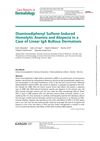Delayed-Onset Hemolytic Anemia in Patients with Travel-Associated Severe Malaria Treated with Artesunate, France, 2011–2013
April 2015
in “
Emerging Infectious Diseases
”

TLDR Artesunate is generally safe for severe malaria, but patients should be monitored for delayed anemia after treatment.
The study conducted in France from 2011 to 2013 on 123 patients with severe imported malaria treated with intravenous artesunate found that while 97 adverse events were reported and 6 patients (5%) died, the treatment was generally safe and effective. Among the 78 patients with adequate follow-up, 76 (97%) developed anemia, with 21 (27%) cases being identified as postartesunate delayed-onset hemolytic anemia (PADH). The median drop in hemoglobin was 1.3 g/dL, and only one patient required a transfusion. PADH was common but typically mild, with only 19.3% of patients needing blood transfusions and no deaths attributed to side effects. The study concluded that despite the risk of delayed hemolysis, intravenous artesunate remains a favorable treatment for severe imported malaria, with recommendations for weekly monitoring of hemoglobin levels for one month post-treatment. Further research is suggested to identify markers for hemolysis and anemia to improve patient follow-up.



